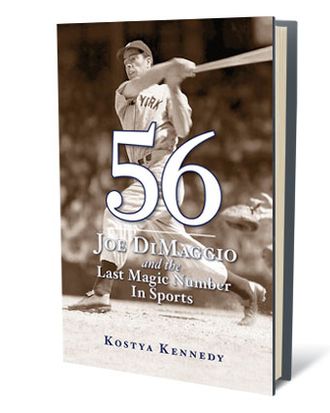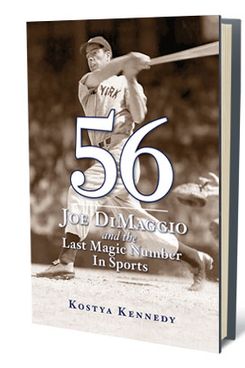

Seventy years ago this summer, Joe DiMaggio hit his way on base in 56 consecutive games, and in doing so established one of baseball’s most iconic records. In 56: Joe DiMaggio and the Last Magic Number in Sports, Sports Illustrated senior editor Kostya Kennedy explores that hitting streak, and how it captivated a country steeling itself for war. Kennedy spoke with The Sports Section about the streak, why DiMaggio was well-suited to handle it, and whether anyone will ever break it.
You write a lot about what was going on in the country in the summer of 1941. How do you think the response to DiMaggio’s streak would have been different had it happened a year later, in 1942?
I think it would have been overshadowed. I don’t think it would have had nearly the resonance. Obviously, the world changed when the bomb was dropped in ‘41, and it’s hard to imagine any baseball event having that sense of drama when the war is going full bore. In ‘41, there was the sort of specter of war, but still maybe hope against hope that it wouldn’t be that bad, or that we wouldn’t lose too many people, and so on. And people who were alive at the time call it for me “the last good summer,” or “the last great summer,” or “the last free summer.”
You write about how DiMaggio wasn’t really interested in studying the opposition’s pitcher, particularly in comparison to Ted Williams. (For example, that DiMaggio sometimes wouldn’t know the opposing pitcher until right before game time.) Do you think DiMaggio would have been a better hitter if he’d played in a later era — say, now — when it would be hard for a player to be so out of the loop? Or is there something to his idea that you can either hit, or you can’t?
I think it’s a case-by-case basis. I think at the time, Williams was much more the exception than the rule. There tended to be people more like DiMaggio, though he particularly didn’t study really. You have guys who go up there and just hack — a guy like Vlad Guerrero. I mean, he’s not like DiMaggio, really. DiMaggio didn’t swing wildly out of the strike zone the way Guerrero does now.
I think in Joe’s case, maybe he would have been force-fed the studying and all of that, but I think that he was a kind of genius, as an athlete, and as a ballplayer. There was a little bit of coaching, and Joe McCarthy, the Yankees manager, was a very astute baseball man. So he imparted that to Joe — in terms of how to hit, and an approach to hitting, and playing the field, and running the bases. But he imparted it nothing like today, where you have a coach on you all the time, and drilling it in. He’d just say something here and there.
Joe understood stuff, and understood stuff even before coming to McCarthy. Everything you hear about him, right from 18 years old and the Pacific Coast League, and even before that, on playgrounds, he understood what to do and how to do it. And that’s the way he played, a lot by instincts. And that’s the way he hit. So probably not much would have changed now, and it’s hard to measure what the impact would have be if he suddenly had five coaches around him every day, in his ear. He probably would have absorbed some of that. But essentially he would have had a similar approach to what he had then.
I’ll ask this in two parts, since you suggest the answer to the first part in the book, but who do you think would be most likely to challenge the streak among active players, and is there a certain type of hitter who’s more likely to make a run at it?
Yeah I think the guy who really jumps out is Ichiro, although the fact that he’s only gotten to 27, which means not even halfway there, is surprising. But simply the fact that he gets so many hits, is the most obvious thing. But he has good speed, he doesn’t walk a lot. He’s very happy to swing, not necessarily way out of the strike zone. He’s a player that doesn’t have the power that DiMaggio did, so he maybe sees a few more strikes. But he definitely doesn’t walk a lot, therefore he gets a lot of at-bats, and is a great hitter. But he’s the most likely guy.
And he’s also, at the same time, the type of hitter that you would expect [would have the best chance at challenging it]. It should be somebody with some speed, because he’ll get a few hits along the way just on the basis of his speed. Somebody who hits near or at the top of the lineup. Again, somebody that doesn’t walk a lot. Typically you’d say it wouldn’t be a power hitter. Maybe you get the rare type of power hitter, like Joe DiMaggio — a combination of power and average. I mean, Albert Pujols, of course, is a great hitter, who would be a candidate, except he’s going to walk. He’s going to walk in that lineup so much that it makes it very unlikely that he’s going to get enough honest at-bats day after day after day, to make a run. So it’s some combination of speed, a lot of at-bats, not walking. If you can bunt — which DiMaggio never did, not once — but if you can bunt your way on, that would help a lot. That helps explains why a guy like Luis Castillo got so far — he got to 35 games in 2002. You know, in New York, we forget what a terrific player Castillo was, great speed, really handled the bat terrifically. That kind of hitter is a candidate as well.
Is it just a matter of the level of competition that just recently, a college player got to 56 games, and that Robin Ventura actually passed it when he was in college?
Yeah, I think that there’s a discrepancy in talent. There are Little League records that are maybe 120 in a row, or something. High school records are very high. You have guys who are basically too good for the league, and I think that’s what it leads to. That doesn’t mean that along the way, they’re not going to face some very good pitchers who will go along and make the major leagues and be really good, but there’s a lot of guys in college ball that are going to play a season or two of college ball and never play again. Or maybe play a little bit in the minors, and that’s it. So yes, it’s not the same level, as you said, but I think it’s just a discrepancy of talent. You have a few guys, like a Ventura, who come along and just are too good for the league.
So as the league has expanded, and the pitching becomes somewhat more diluted while the top hitters remain the top hitters, do you think that makes it any more likely that someone would make a run?
It kind of cuts both ways, because the pitchers were stronger then — you had fewer teams — but also, in ‘41, you had no African-American ballplayers, you had no Latin or Asian players. So the talent pool was much smaller as well. You also had pitchers that tended to go longer in games, and now you tend to get a fresh pitcher more often. The flip side of that is that sometimes, that fresh pitcher is just not a very good pitcher. That’s very often the case. I looked at this up and down, and I find that for almost anything you can say “Well, this is how it was then, so it’s easier now,” or “This is how it is now, so it was easier then” — they kind of cancel each other out. I think it’s basically a level playing field, that you can whittle away at things here and there and come up with something, but basically, in my final analysis, it’s a level playing field. The chances of doing it today are just about the same as they were in ‘41, which means, not bloody likely.
You write in one of the chapters that thinking about a streak is probably going to hurt a hitter. Is that something DiMaggio was well-suited to handle, not over-thinking it?
I think that he did think about it, and certainly became aware that he was establishing something for himself, that it was an important thing he was doing, not least because he’d had a streak earlier in his career, in the Pacific Coast League, that had generated some excitement. So he was certainly aware. But I think DiMaggio was helped by the fact that he was generally pretty self-conscious, on the ballfield, and off the ballfield. So when a time like this came, of heightened intensity, and what would be a higher degree of self-consciousness for him or for anybody else, he was a little better suited to it than somebody who was not normally self-conscious. He managed to play the way he always played, for the most part.
Do you think somebody will ever break it, and if so, do you think that player is someone playing today?
I don’t think anybody will break it, though as I say that, it’s certainly possible that I’m wrong. And I guess it’s as likely that somebody will do it now as some other time. It’s a unique streak. It’s hard to imagine a player coming along that’s going to be more dominant than Babe Ruth, or whoever you want to pick. Ted Williams, what a dominant hitter Ted Williams was. Is a hitter going to come along and do much better than George Brett did, when he hit .390? If something totally unforeseen happens, then something totally unforeseen happens. But I guess my answer is I don’t think it’ll happen, but if it does, it’s just as likely to happen with one of the really good hitters we talked about earlier in the game today as it is with somebody who’ll come along three, four, ten years from now.